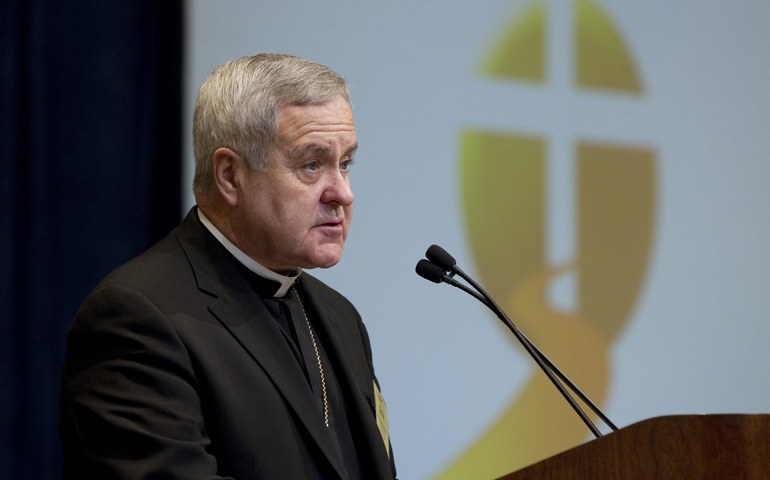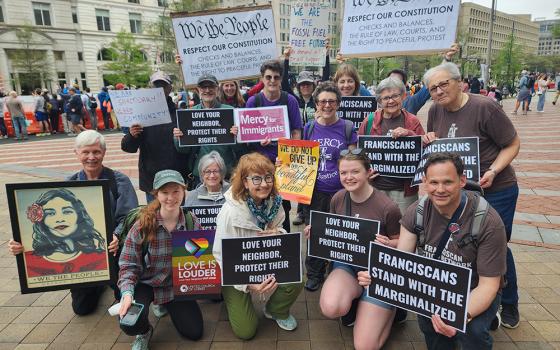
Archbishop Robert Carlson of St. Louis speaks at a USCCB meeting in 2012. (CNS/Nancy Phelan Wiechec)
Update II: I may have been too hasty to report on a statement from the St. Louis archdiocese this morning. See: Is St. Louis archdiocese taking the archbishop’s quotes out of context?
Update: Archbishop Robert J. Carlson's statement has been taken out context to suggest "that the Archbishop did not know that it was a criminal offense for an adult to molest a child. Nothing could be further from the truth,” says a statement the archdiocese released June 11. “Recent inaccurate and misleading reporting by certain media outlets has impugned Archbishop Carlson’s good name and reputation,” the statement says. Read More.
The original story:
Archbishop Robert J. Carlson claimed to be uncertain that he knew sexual abuse of a child by a priest constituted a crime when he was auxiliary bishop in the archdiocese of St. Paul and Minneapolis, according to a deposition released Monday.
During the deposition taken last month, attorney Jeff Anderson asked Carlson whether he knew it was a crime for an adult to engage in sex with a child.
"I'm not sure whether I knew it was a crime or not," Carlson replied. "I understand today it's a crime." Carlson, who turns 70 at the end of this month, was auxiliary bishop in St. Paul and Minneapolis from 1984-1994.
Anderson went on to ask Carlson whether he knew in 1984, when he was an auxiliary bishop in the archdiocese of St. Paul and Minneapolis, that it was crime for a priest to engage in sex with a child.
"I'm not sure if I did or didn't," Carlson said.
Yet according to documents released Monday by the law firm Jeff Anderson & Associates in St. Paul, Carlson showed clear knowledge that sexual abuse was a crime when discussing incidents with church officials during his time in Minnesota.
In a 1984 document, for example, Carlson wrote to the then-archbishop of St. Paul and Minneapolis -- John R. Roach -- about one victim of sexual abuse and mentioned that the statute of limitations for filing a claim would not expire for more than two years. He also wrote that the parents of the victim were considering reporting the incident to the police.
In a statement, Gabe Jones, spokesman for the St. Louis archdiocese, said "while not being able to recall his knowledge of the law exactly as it was many decades ago, the archbishop did make clear that he knows child sex abuse is a crime today."
"The question does not address the archbishop's moral stance on the sin of pedophilia, which has been that it is a most egregious offense," Jones said.
Anderson took Carlson's deposition as part of a sexual abuse lawsuit in Minnesota involving the archdiocese of St. Paul and Minneapolis and the diocese of Winona, Minn.
The plaintiff in the case, only identified as "Doe 1," claims to have been abused in the 1970s by Fr. Thomas Adamson at St. Thomas Aquinas Catholic Church in St. Paul Park, Minn.
Later in the deposition, when asked about an incident of alleged sexual abuse of a minor by another priest in the archdiocese of St. Paul and Minneapolis, Fr. Jerome Kern, Anderson asks Carlson:
"But you knew a priest touching the genitals of a kid to be a crime, did you not?", referring to what a 1987 church memo said about the alleged incident of abuse.
"Yes," Carlson replied.
Carlson goes on to admit that he never personally reported any incidents of sexual abuse to the police, though he says he encouraged parents to do so at least once.
Carlson also said that even in 1996, he did not know that pedophilia was a disorder that couldn't be cured.
"I did not know that, but as a pastor, I was becoming increasingly concerned," Carlson said.
With regard to the history of sexual abuse in the church, Carlson seemed to suggest he did the best he could at the time.
"I think in everything we do, once we've experienced it, we reflect on our actions and we ask what we can do better," Carlson said. "I think we did a pretty good job."
"Obviously, based on some 25 years later, I would do it differently."
Anderson then asked, "Don't you think you should have done it differently then?"
"I did what I did," Carlson replied.
"I think counselors made mistakes. I think people in general made mistakes. I think the archdiocese made mistakes," Carlson said. "I think if you go back in history, I think the whole culture did not know what they were dealing with. I think therapists didn't. I don't think we fully understood."
But over and over, throughout the deposition, Carlson claimed to not remember answers to questions posed by Anderson -- for a total of 193 times.
Anderson asked Carlson if there was any physical condition or illness that was impeding his memory.
"I can't make either a psychological or a physical diagnosis, other than to say I have had seven cancer surgeries. Each time I received some kind of chemical to put me out for that. If that's impeded my memory or not, I have no idea," Carlson answered. "My concern is that what I say to you would be accurate."
Anderson has also taken Carlson's deposition for a priest sexual abuse case scheduled for trial July 7 in St. Louis. That deposition is under seal.
According to Anderson, Carlson was involved in handling sexual abuse cases in Minnesota for 15 years.
[Lilly Fowler is the religion reporter at the St. Louis Post-Dispatch. Follow her on Twitter.]



